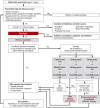Clinical Practice Guideline: Sore Throat
- PMID: 33602392
- PMCID: PMC8245861
- DOI: 10.3238/arztebl.m2021.0121
Clinical Practice Guideline: Sore Throat
Abstract
Background: Sore throat is a common reason for consultation of primary care physicians, pediatricians, and ENT specialists. The updated German clinical practice guideline on sore throat provides evidence-based recommendations for treatment in the German healthcare system.
Methods: Guideline revision by means of a systematic search of the literature for international guidelines and systematic reviews. All recommendations resulted from interdisciplinary cooperation and were agreed by formal consensus. The updated guideline applies to patients aged 3 years and over.
Results: In the absence of red flags such as immunosuppression, severe comorbidity, or severe systemic infection, acute sore throat is predominantly self-limiting. The mean duration is 7 days. Chronic sore throat usually has noninfectious causes. Laboratory tests are not routinely necessary. Apart from non-pharmacological self-management, ibuprofen and naproxen are recommended for symptomatic treatment. Scores can be used to assess the risk of bacterial pharyngitis: one point each is assigned for tonsil lesions, palpable cervical lymph nodes, patient age, disease course, and elevated temperature. If the risk is low (<3 points), antibiotics are not indicated; if at least moderate (3 points), delayed prescribing is recommended; if high (>3 points), antibiotics can be taken immediately. Penicillin remains the first choice, with clarithromycin as an alternative for those who do not tolerate penicillin. The antibiotic should be taken for 5-7 days.
Conclusion: After the exclusion of red flags, antibiotic treatment is unnecessary in many cases of acute sore throat. If administration of antibiotics is still considered in spite of consultation on the usual course of tonsillopharyngitis and the low risk of complications, a risk-adapted approach using clinical scores is recommended.
Figures





Comment in
-
Delayed Diagnosis of Bacterial Infections during the Pandemic with Fatal Course.Dtsch Arztebl Int. 2021 Aug 9;118(31-32):542. doi: 10.3238/arztebl.m2021.0246. Dtsch Arztebl Int. 2021. PMID: 34612195 Free PMC article. No abstract available.
-
Rule out Thyroid Disease.Dtsch Arztebl Int. 2021 Aug 9;118(31-32):542. doi: 10.3238/arztebl.m2021.0245. Dtsch Arztebl Int. 2021. PMID: 34612196 Free PMC article. No abstract available.
References
-
- Kühlein T, Laux G, Gutscher A, Szecsenyi J. Urban & Vogel. München: 2008. Kontinuierliche Morbiditätsregistrierung in der Hausarztpraxis Vom Beratungsanlass zum Beratungsergebnis; 48 pp.
-
- Kronman MP, Zhou C, Mangione-Smith R. Bacterial prevalence and antimicrobial prescribing trends for acute respiratory tract infections. Pediatrics. 2014;134:e956–e965. - PubMed
-
- Hansmann-Wiest J, Kaduszkiewicz H, Hedderich J, et al. DEGAM-Leitlinie zur Senkung der Antibiotikaverschreibungsrate bei Halsschmerzen geeignet? Kongressbeitrag, Kongress für Allgemeinmedizin und Familienmedizin Innsbruck, 2018. www.egms.de/static/en/meetings/degam2018/18degam086.shtml (last accessed on 23 December 2020)
Publication types
MeSH terms
Substances
LinkOut - more resources
Full Text Sources
Other Literature Sources
Medical
Research Materials
Miscellaneous

